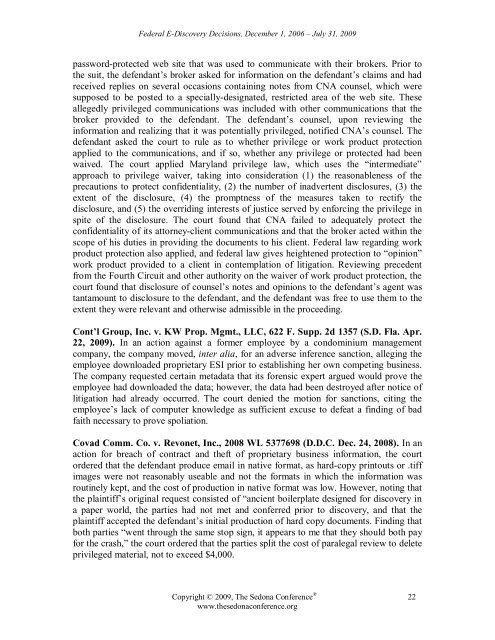Federal Court Decisions Involving Electronic Discovery, December 1 ...
Federal Court Decisions Involving Electronic Discovery, December 1 ...
Federal Court Decisions Involving Electronic Discovery, December 1 ...
Create successful ePaper yourself
Turn your PDF publications into a flip-book with our unique Google optimized e-Paper software.
<strong>Federal</strong> E-<strong>Discovery</strong> <strong>Decisions</strong>, <strong>December</strong> 1, 2006 – July 31, 2009<br />
password-protected web site that was used to communicate with their brokers. Prior to<br />
the suit, the defendant’s broker asked for information on the defendant’s claims and had<br />
received replies on several occasions containing notes from CNA counsel, which were<br />
supposed to be posted to a specially-designated, restricted area of the web site. These<br />
allegedly privileged communications was included with other communications that the<br />
broker provided to the defendant. The defendant’s counsel, upon reviewing the<br />
information and realizing that it was potentially privileged, notified CNA’s counsel. The<br />
defendant asked the court to rule as to whether privilege or work product protection<br />
applied to the communications, and if so, whether any privilege or protected had been<br />
waived. The court applied Maryland privilege law, which uses the “intermediate”<br />
approach to privilege waiver, taking into consideration (1) the reasonableness of the<br />
precautions to protect confidentiality, (2) the number of inadvertent disclosures, (3) the<br />
extent of the disclosure, (4) the promptness of the measures taken to rectify the<br />
disclosure, and (5) the overriding interests of justice served by enforcing the privilege in<br />
spite of the disclosure. The court found that CNA failed to adequately protect the<br />
confidentiality of its attorney-client communications and that the broker acted within the<br />
scope of his duties in providing the documents to his client. <strong>Federal</strong> law regarding work<br />
product protection also applied, and federal law gives heightened protection to “opinion”<br />
work product provided to a client in contemplation of litigation. Reviewing precedent<br />
from the Fourth Circuit and other authority on the waiver of work product protection, the<br />
court found that disclosure of counsel’s notes and opinions to the defendant’s agent was<br />
tantamount to disclosure to the defendant, and the defendant was free to use them to the<br />
extent they were relevant and otherwise admissible in the proceeding.<br />
Cont’l Group, Inc. v. KW Prop. Mgmt., LLC, 622 F. Supp. 2d 1357 (S.D. Fla. Apr.<br />
22, 2009). In an action against a former employee by a condominium management<br />
company, the company moved, inter alia, for an adverse inference sanction, alleging the<br />
employee downloaded proprietary ESI prior to establishing her own competing business.<br />
The company requested certain metadata that its forensic expert argued would prove the<br />
employee had downloaded the data; however, the data had been destroyed after notice of<br />
litigation had already occurred. The court denied the motion for sanctions, citing the<br />
employee’s lack of computer knowledge as sufficient excuse to defeat a finding of bad<br />
faith necessary to prove spoliation.<br />
Covad Comm. Co. v. Revonet, Inc., 2008 WL 5377698 (D.D.C. Dec. 24, 2008). In an<br />
action for breach of contract and theft of proprietary business information, the court<br />
ordered that the defendant produce email in native format, as hard-copy printouts or .tiff<br />
images were not reasonably useable and not the formats in which the information was<br />
routinely kept, and the cost of production in native format was low. However, noting that<br />
the plaintiff’s original request consisted of “ancient boilerplate designed for discovery in<br />
a paper world, the parties had not met and conferred prior to discovery, and that the<br />
plaintiff accepted the defendant’s initial production of hard copy documents. Finding that<br />
both parties “went through the same stop sign, it appears to me that they should both pay<br />
for the crash,” the court ordered that the parties split the cost of paralegal review to delete<br />
privileged material, not to exceed $4,000.<br />
Copyright © 2009, The Sedona Conference ® 22<br />
www.thesedonaconference.org
















